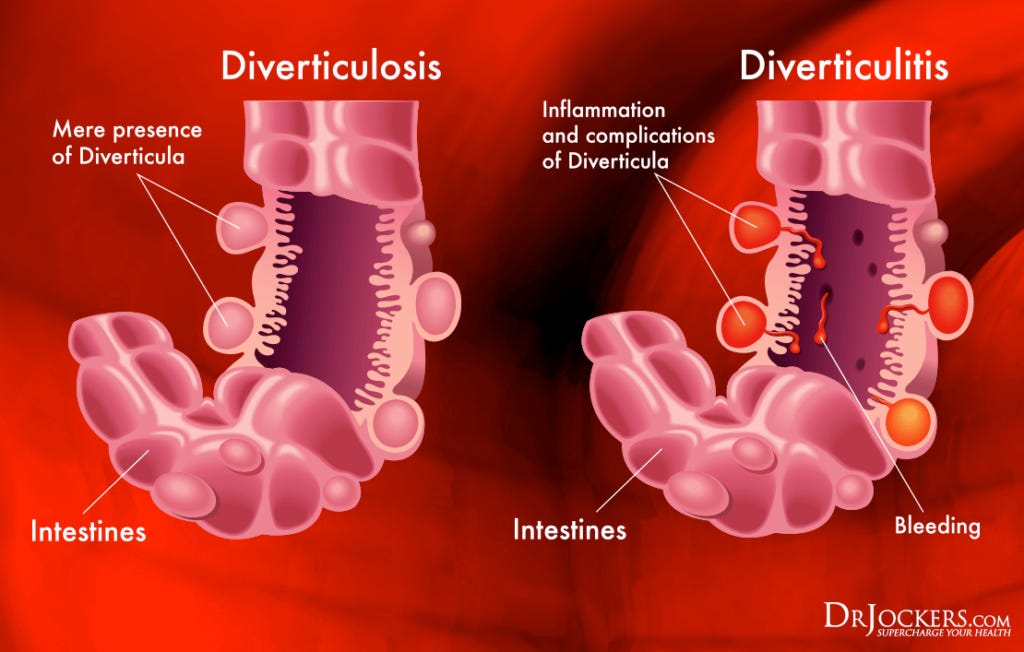"I'll Do Anything to Prevent Diverticulitis!"
Diverticulitis: an intestinal disease that is tough to treat but easy to prevent.
I hadn’t heard from my patient in a while after she moved with her husband to Dubai. Her career was going well, but she was dealing with a condition that had her in and out of hospitals, juggling multiple antibiotics, wrecking her gut and digestion. Her battle with diverticulitis led to the surgical removal of part of her colon, but now she was facing her next bout of diverticulitis.
Diverticulosis Can Lead to Diverticulits
The idea is that as food goes down the intestines it slows down and gets harder and eventually turns into the feces we excrete. For some, it can become hard enough that it increases the pressure in the colon.
Add to that a poor diet where the body doesn’t get the nutrients necessary to develop healthy tissues, and the lining of the large intestine weakens, allowing these outpouchings to develop - diverticulosis.
Once these pouches develop, you likely will never get rid of them. If the pressure in the gut continues and if the wrong bacteria overgrow, they’ll accumulate in these pouches which then become infected.
Preventing Diverticulitis Through Lifestyle
The data shows that a higher intake of fiber is associated with a lower risk of developing diverticulosis, which then often develops into diverticulitis. The same fiber can help prevent this disease's progression and flare-ups.
A more Western-style diet was shown to increase the risk of developing diverticulitis. Therefore, we could conclude that decreasing the amount of ultraprocessed foods and excessive protein and fat intake without enough fiber increases the risk of diverticulitis.
Exercise Can Prevent Diverticulitis
We know exercise is good for the musculoskeletal and endocrine systems. Somehow, it’s also good for the intestines, but we’re not sure why. The current theory is that it decreases pressures in the intestines, improves the flow of stool through the large intestine, and decreases inflammatory markers that could lead to a flare-up of diverticulosis.
What kind of exercise is needed? Chances are, with even very light exercise, there will be huge benefits. Could more exercise offer even more value? Perhaps, but chances are the benefits taper off after a certain amount.
As always, I tell my patients to at least walk if they do nothing else. And all other activities, including house chores and yard work, count as exercise.
What Can You Do To Prevent Diverticulitis?
As always, at DrAshori.com, our goal is to first subtract unnecessary or harmful things before introducing necessary and helpful options. So, cutting back on ultraprocessed foods from the diet, such as:
Sugary breakfast cereals
Packaged snacks and pastries
Soda and sweetened beverages
Instant noodles & boxed macaroni
Processed meats like hotdogs and chicken nuggets
Next, we add in foods that decrease the pressure in the colon and improve the movement of stool through the large intestines, such as:
Legumes (I like hummus)
Whole grains (home-made whole-wheat bread)
Fruits (apples, pears, berries, tomatoes)
Vegetables (spinach, roasted cauliflower, celery soup)
Nuts & Seeds (Yes, these are safe!)
Ready to Prevent Future Diverticulitis Attacks?
Even if you have been diagnosed with diverticulosis or had previous diverticulitis infections, it’s not too late to help your large intestine heal enough to prevent future attacks.
Taking steps to prevent diverticulitis doesn’t have to feel overwhelming. Start implementing the tips above and check in with your physician for guidance. If you’re ready for a more personalized approach, visit www.DrAshori.com to explore customized plans that fit your unique health needs. Let’s make prevention a priority—together.



